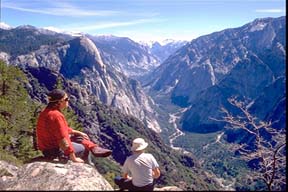Sierra Student Coalition
Insider Info
Suppose a multinational company wanted to build a mine in the center of
your favorite wilderness area. What would you do?
"An activist bought stocks in the company, went to a shareholders' meeting
and got shareholders to vote against it," says Megan Fowler, the media liaison
for the Sierra Club in the U.S.
In the southern plains region of the U.S., the lobby efforts of Sierra
Club members won stronger regulations to control the wastes from factory farms
for hogs and chickens.
"It was basically a problem of untreated waste that could run into groundwater
and surface water -- and odors," explains Sierra Student Coalition (SSC) member
Emily McCauley. "We got a good chicken bill and we got stronger regulations
on hog farms, so we definitely consider it a success!"
 |
| Fulfilling the Sierra Club's mission to explore, enjoy and protect
the wild places of the Earth, Sierra Club Outings sponsors about 330 national
outings each year. |
| Courtesy of: Sierra Club |
In Canada, the Sierra Club is working to stop clear-cutting in the Great
Bear Rainforest. "We're looking for any motivated student who wants to get
involved and wants to donate time to saving the planet," says SSC coordinator
Rita Turner.
Not ready for a full-scale environmental campaign? Getting involved can
be as simple as volunteering to do administrative duties at your local Sierra
Club office. "We have folks who come in once a week and help us do faxing,
clipping, photocopying and that sort of thing," says Rita Morbia with the
Sierra Club.
The Sierra Club is the oldest environmental group in North America, with
over 550,000 members in the U.S. and Canada. The student branch has 14,000
members in the U.S.
Director Amelia Clarke says members can attend conferences or host speakers
at their school or university. "We switch campaigns every six months so people
get a chance to learn about different issues."
Who says you can't fight city hall? As a member of the Sierra Youth Coalition,
16-year-old Myroslava Tataryn knows what it's like to take on city hall and
win.
At issue was a landscape project outside her school. It was planted with
prairie short-grass, an indigenous plant which has largely disappeared due
to agriculture and urbanization.
"Eighty-five percent of the prairie ecosystem has been destroyed," says
Tataryn. As far as the school was concerned, the landscape project was a success.
But the city felt it was an eyesore and potential fire hazard.
"The city ordered us to cut it down, and we said no," says Tataryn.
Along with a delegation from the school board, Tataryn spoke to city council
on behalf of the students.
"I told them there are so many plants and animals that exist only in this
type of ecosystem and talked about the educational aspect. As students we're
always being told 'preserve this, protect that' with no concrete examples,
and now we have it outside our door."
City councilors were impressed and reversed their decision.
Tataryn says the controversy helped educate the community, and now other
schools are looking at landscaping with indigenous plants. "It saves a lot
of money on upkeep. There are no pesticides, herbicides, and it doesn't have
to be mowed or watered, it just lives on rain."
University student Yuill Herbert had to take on a different form of government.
He and other volunteers worked to get their university to adopt a comprehensive
environmental policy. "Whenever a decision is made, the university will consider
environmental policies, as well as economic," he says.
Herbert warns that you need to be patient. "You're dealing with a big bureaucracy
and things happen slow!"
The university's policy is the first of its kind. Herbert says it's prompting
calls from universities as far away as Edinburgh and Kentucky.
"It's raised a lot of awareness and it's changed the way some people think,"
he says.
Anne Ahlander wishes more people would consider the environmental impact
of their actions. "It's not right for Jeep owners to drive through a large
field of sagebrush just because they can," she says.
Ahlander's strong feelings on off-road etiquette were developed as a Sierra
Club volunteer who helped create a citizen's inventory for the Utah Wilderness
Coalition. As field workers, Ahlander and her boyfriend would follow old maps
on weekends to see if roads mapped in the 1970s were still in use.
In some cases, new roads had appeared which they had to follow to their
end. In other cases, roads had deteriorated to rough trails. Ahlander says
there was a lot of mud, and even snow at higher elevations.
"I remember last year actually being snowed in. I had to sleep in my car
overnight because there was this horrendous blizzard," she says.
The information gathered by field workers like Ahlander helped identify
9.1 million acres of land that should qualify as wilderness according to guidelines
from Utah's Bureau of Land Management.
Ahlander says identifying wilderness is the first step to protecting it
from mining, logging, ranching and other intrusions.
"Once land is scarred up, it cannot qualify as pristine [part of the definition
of wilderness]. So now we're trying to educate people with off-road vehicles
and mountain bikes how important it is to stay on designated roads," she says.
How to Get Involved
Contact your local Sierra Club! Not sure if you have a local Sierra Club?
Get in touch with the national office to find out.
Associations
Sierra Club
85 Second St., 2nd Floor
San Francisco
,
CA
94105
USA
Internet
:
http://www.sierraclub.org/
Sierra Student Coalition
P.O. Box 2402
Providence
,
RI
02906
USA
Internet
:
http://www.ssc.org/
Links
Sierra Magazine
Sierra Club Los Angeles
Great pictures and learning tools
Sierra Club British Columbia
Great pictures and learning tools
Sierra Club Massachusetts Chapter
You can add your name to e-petitions
Back to Career Cluster